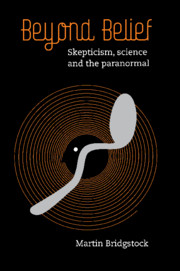Book contents
- Frontmatter
- Contents
- Preface
- Introduction: The paranormal and why it matters
- Chapter 1 The nature of science
- Chapter 2 The paranormal
- Chapter 3 Skepticism – from Socrates to Hume
- Chapter 4 Modern skepticism
- Chapter 5 Bringing skepticism down to earth
- Chapter 6 Skepticism, ethics and survival
- Chapter 7 Skepticism beyond the paranormal
- Bibliography
- Index
Chapter 7 - Skepticism beyond the paranormal
Published online by Cambridge University Press: 05 April 2010
- Frontmatter
- Contents
- Preface
- Introduction: The paranormal and why it matters
- Chapter 1 The nature of science
- Chapter 2 The paranormal
- Chapter 3 Skepticism – from Socrates to Hume
- Chapter 4 Modern skepticism
- Chapter 5 Bringing skepticism down to earth
- Chapter 6 Skepticism, ethics and survival
- Chapter 7 Skepticism beyond the paranormal
- Bibliography
- Index
Summary
We have seen that skepticism is a powerful tool in evaluating paranormal claims. We have started with a set of important skeptical principles, and have argued that these are crucial in grasping the nature of the argument. Between them, the burden of proof, Occam's razor and Sagan's balance provide the kernel of a skeptical approach to all aspects of the paranormal.
In addition, we have seen that a range of intermediate concepts are needed to link the general principles with the paranormal claim. For example, claims that an alternative therapy can cure diseases – with an amazing story of how someone was cured – can lead to discussion in terms of the placebo effect, and the need for double-blind controlled experiments to see whether the treatment actually works. The burden of proof is clearly on the claimant. Since the claim is an amazing one, Sagan's balance suggests that the quality of evidence must be extremely high. Finally, if the placebo effect can explain the results, there is no need for the paranormal explanation at all. In this way, thinking about the paranormal can be revolutionised by the use of these basic principles, and the intermediate concepts.
Paranormal ideas are only a small fraction of all ideas in the world. In this chapter we ask an important question: have skeptical approaches any value outside the field of the paranormal?
- Type
- Chapter
- Information
- Beyond BeliefSkepticism, Science and the Paranormal, pp. 164 - 185Publisher: Cambridge University PressPrint publication year: 2009



